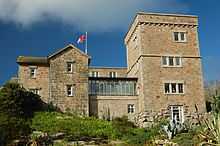Thomas Algernon Smith-Dorrien-Smith

Lieutenant Thomas Algernon Smith-Dorrien-Smith JP, DL, (7 Feb 1846 – 6 Aug 1918) was Lord Proprietor of the Isles of Scilly from 1872 - 1918.[1]
Family
Thomas Algernon Smith-Dorrien-Smith was born on 7 February 1846 at Berkhamsted in Hertfordshire. He was the son of Robert Algernon Smith-Dorrien and Mary Ann Drever. His younger brother was Horace Smith-Dorrien. He married Edith Anna Maria Tower (d. 17 Jan 1792), daughter of Christopher Theron Tower and Lady Sophia Frances Cust, on 8 April 1875. The children of this marriage were:
- Major Arthur Algernon Smith-Dorrien-Smith (28 Jan 1876 – 30 May 1955) married on 11 May 1909 to Eleanor Salvin Bowlby, daughter of Edward Salvin Bowlby and Elizabeth Vans Agnew.
- Mary Sophia Smith-Dorrien-Smith (9 Nov 1877 – 22 Dec 1948) married on 3 July 1902 to Townshend Evelyn Boscawen, son of Rev. Hon. John Townshend Boscawen and Mary Tremayne.
- Major Edward Pendarves Smith-Dorrien-Smith (26 Feb 1878 – 12 Oct 1937) married on 2 June 1915 to Frances Amy Salvin Bowlby, daughter of Edward Salvin Bowlby and Elizabeth Vans Agnew.
- Edith Innis Smith-Dorrien-Smith (b. 1 Jan 1881)
- Cicely Frances Smith-Dorrien-Smith (b. 4 Nov 1882)
- Gwendolen Smith-Dorrien-Smith (b. 7 Nov 1883)
- Charlotte Smith-Dorrien-Smith (b. c 1886)
He was given the name of Thomas Algernon Smith-Dorrien at birth. In 1872 he changed his name by Royal Licence to Thomas Algernon Smith-Dorrien-Smith.
Career
He was educated at Harrow School. From 1864 to 1874 he served in the 10th Royal Hussars achieving the rank of Lieutenant.
He succeeded his uncle, Augustus Smith as Proprietor of the Isles of Scilly in 1872, and continued the development of the Tresco Abbey Gardens. He is considered to be the person who saw the potential for the export of flowers from the Islands,[2] a trade which continues to this day.
A week after his marriage, the SS Schiller was wrecked in the Isles of Scilly. William I, German Emperor awarded him the Order of the Red Eagle and his wife a gold bracelet for their work with survivors.
He was a Justice of the Peace, and later Deputy Lieutenant of Cornwall. He was elected a Member of the British Ornithologists' Union in 1904.[3]